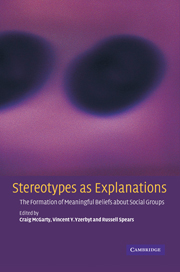Book contents
- Frontmatter
- Contents
- List of figures
- List of contributors
- Preface
- 1 Social, cultural and cognitive factors in stereotype formation
- 2 Stereotype formation as category formation
- 3 Subjective essentialism and the emergence of stereotypes
- 4 The role of theories in the formation of stereotype content
- 5 Illusory correlation and stereotype formation: making sense of group differences and cognitive biases
- 6 Dependence and the formation of stereotyped beliefs about groups: from interpersonal to intergroup perception
- 7 Four degrees of stereotype formation: differentiation by any means necessary
- 8 From personal pictures in the head to collective tools in the world: how shared stereotypes allow groups to represent and change social reality
- 9 Conclusion: stereotypes are selective, variable and contested explanations
- References
- Author index
- Subject index
8 - From personal pictures in the head to collective tools in the world: how shared stereotypes allow groups to represent and change social reality
Published online by Cambridge University Press: 22 September 2009
- Frontmatter
- Contents
- List of figures
- List of contributors
- Preface
- 1 Social, cultural and cognitive factors in stereotype formation
- 2 Stereotype formation as category formation
- 3 Subjective essentialism and the emergence of stereotypes
- 4 The role of theories in the formation of stereotype content
- 5 Illusory correlation and stereotype formation: making sense of group differences and cognitive biases
- 6 Dependence and the formation of stereotyped beliefs about groups: from interpersonal to intergroup perception
- 7 Four degrees of stereotype formation: differentiation by any means necessary
- 8 From personal pictures in the head to collective tools in the world: how shared stereotypes allow groups to represent and change social reality
- 9 Conclusion: stereotypes are selective, variable and contested explanations
- References
- Author index
- Subject index
Summary
Stereotyping and stereotype formation: two metatheories
When it was initiated some seventy or so years ago, research into stereotype formation was primarily oriented to the question of why it is that certain attributes come to be associated with particular social groups in the minds of members of the same or other groups. Confronted with findings from the very first empirical studies of stereotype content in which Princeton students were asked to select five traits from a list of eighty-four to describe various national and ethnic groups, Katz and Braly (1933) asked why the students believed that Americans were industrious, Germans scientifically minded, Jews shrewd and Negroes superstitious. As can be seen from Table 8.1, social psychology went on to provide a rich array of answers to such questions. Amongst other things, these pointed to the role of processes that are psychodynamic, socio-cultural and cognitive in origin, and to the mediating role of specific mechanisms such as projection, ethnocentrism, learning, accentuation and illusory correlation.
Varied as these mechanisms are, all this research has the shared features of, on the one hand, explaining stereotype content as a product of psychological shortcomings. It suggests, amongst other things, that people hold their stereotypes because of their aberrant personalities, their biased learning and cognition, or their limited information processing capacity. On the other hand, the research also sees that content as itself inappropriate. It suggests that stereotype content is biased, distorted and erroneous (see Oakes, Haslam & Turner, 1994, for a review).
- Type
- Chapter
- Information
- Stereotypes as ExplanationsThe Formation of Meaningful Beliefs about Social Groups, pp. 157 - 185Publisher: Cambridge University PressPrint publication year: 2002
- 50
- Cited by

